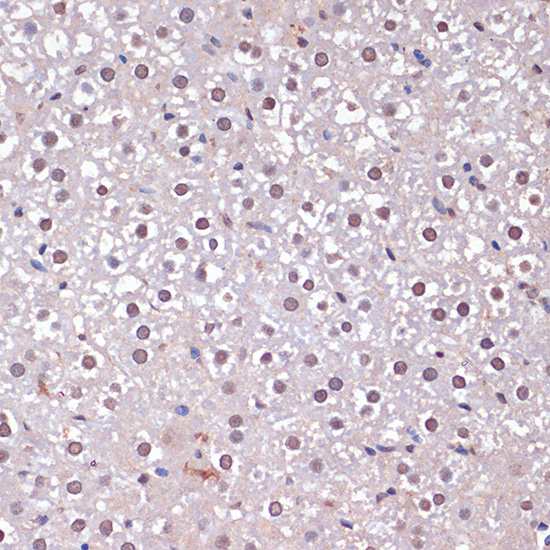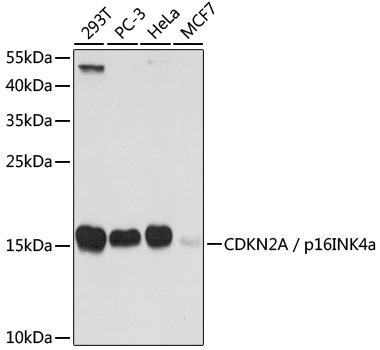-
Product Name
Anti-CDKN2A/p16INK4a Rabbit antibody
- Documents
-
Description
CDKN2A/p16INK4a Rabbit polyclonal antibody
-
Tested applications
WB, IHC-P
-
Species reactivity
Human, Mouse, Rat
-
Alternative names
ARF; MLM; P14; P16; P19; CMM2; INK4; MTS1; TP16; CDK4I; CDKN2; INK4A; MTS-1; P14ARF; P19ARF; P16INK4; P16INK4A; P16-INK4A antibody
-
Isotype
Rabbit IgG
-
Preparation
Antigen: A synthetic peptide corresponding to a sequence within amino acids 20 to the C-terminus of human CDKN2A / p16INK4a.NCADPATLTRPVHDAAREGFLDTLVVLHRAGARLDVRDAWGRLPVDLAEELGHRDVARYLRAAAGGTRGSNHARIDAAEGPSDIPD
-
Clonality
Polyclonal
-
Formulation
PBS with 0.02% sodium azide,50% glycerol,pH7.3.
-
Storage instructions
Store at -20°C . Avoid freeze / thaw cycles.
-
Applications
WB: 1/500 - 1/2000
IF: 1/50 - 1/200
-
Validations

Immunofluorescence - CDKN2A / p16INK4a Polyclonal Antibody. Immunofluorescence analysis of A549 cells using CDKN2A / p16INK4a antibody .

Western blot - CDKN2A / p16INK4a Polyclonal Antibody. Western blot analysis of extracts of various cell lines, using CDKN2A / p16INK4a antibody at 1:1000 dilution.Secondary antibody: HRP Goat Anti-Rabbit IgG at 1:10000 dilution.Lysates/proteins: 25ug per lane.Blocking buffer: 3% nonfat dry milk in TBST.Exposure time: 15s.
-
Background
Swiss-Prot Acc.P42771/Q8N726.This gene generates several transcript variants which differ in their first exons. At least three alternatively spliced variants encoding distinct proteins have been reported, two of which encode structurally related isoforms known to function as inhibitors of CDK4 kinase. The remaining transcript includes an alternate first exon located 20 Kb upstream of the remainder of the gene; this transcript contains an alternate open reading frame (ARF) that specifies a protein which is structurally unrelated to the products of the other variants. This ARF product functions as a stabilizer of the tumor suppressor protein p53 as it can interact with, and sequester, the E3 ubiquitin-protein ligase MDM2, a protein responsible for the degradation of p53. In spite of the structural and functional differences, the CDK inhibitor isoforms and the ARF product encoded by this gene, through the regulatory roles of CDK4 and p53 in cell cycle G1 progression, share a common functionality in cell cycle G1 control. This gene is frequently mutated or deleted in a wide variety of tumors, and is known to be an important tumor suppressor gene.
Related Products / Services
Please note: All products are "FOR RESEARCH USE ONLY AND ARE NOT INTENDED FOR DIAGNOSTIC OR THERAPEUTIC USE"
